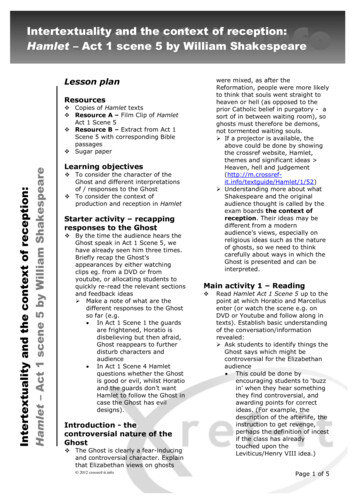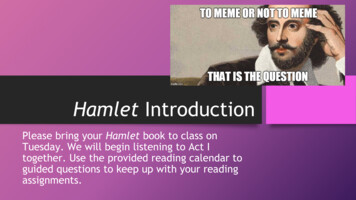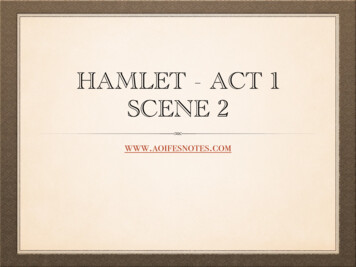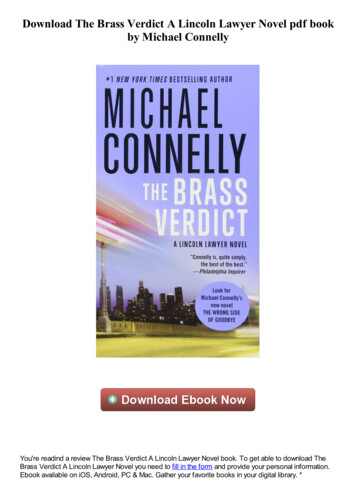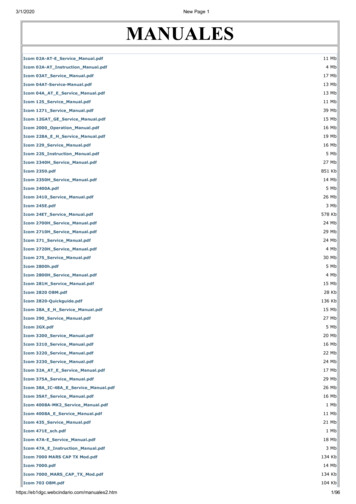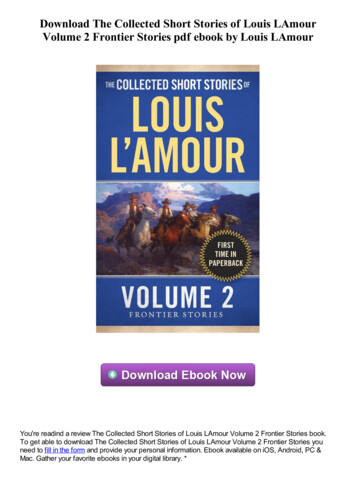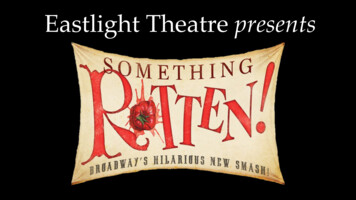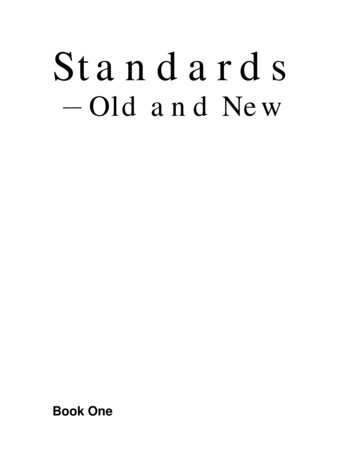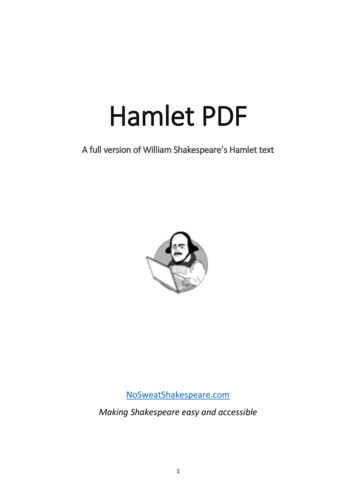
Transcription
Hamlet PDFA full version of William Shakespeare’s Hamlet textNoSweatShakespeare.comMaking Shakespeare easy and accessible1
ACT ISCENE I. Elsinore. A platform before the castle.FRANCISCO at his post. Enter to him BERNARDOBERNARDOWho's there?FRANCISCONay, answer me: stand, and unfold yourself.BERNARDOLong live the king!FRANCISCOBernardo?BERNARDOHe.FRANCISCOYou come most carefully upon your hour.BERNARDO'Tis now struck twelve; get thee to bed, Francisco.FRANCISCOFor this relief much thanks: 'tis bitter cold,And I am sick at heart.BERNARDOHave you had quiet guard?FRANCISCONot a mouse stirring.BERNARDOWell, good night.If you do meet Horatio and Marcellus,The rivals of my watch, bid them make haste.FRANCISCOI think I hear them. Stand, ho! Who's there?Enter HORATIO and MARCELLUSHORATIOFriends to this ground.MARCELLUSAnd liegemen to the Dane.FRANCISCOGive you good night.MARCELLUSO, farewell, honest soldier:Who hath relieved you?FRANCISCOBernardo has my place.Give you good night.ExitMARCELLUSHolla! Bernardo!BERNARDOSay,2
What, is Horatio there?HORATIOA piece of him.BERNARDOWelcome, Horatio: welcome, good Marcellus.MARCELLUSWhat, has this thing appear'd again to-night?BERNARDOI have seen nothing.MARCELLUSHoratio says 'tis but our fantasy,And will not let belief take hold of himTouching this dreaded sight, twice seen of us:Therefore I have entreated him alongWith us to watch the minutes of this night;That if again this apparition come,He may approve our eyes and speak to it.HORATIOTush, tush, 'twill not appear.BERNARDOSit down awhile;And let us once again assail your ears,That are so fortified against our storyWhat we have two nights seen.HORATIOWell, sit we down,And let us hear Bernardo speak of this.BERNARDOLast night of all,When yond same star that's westward from the poleHad made his course to illume that part of heavenWhere now it burns, Marcellus and myself,The bell then beating one,-Enter GhostMARCELLUSPeace, break thee off; look, where it comes again!BERNARDOIn the same figure, like the king that's dead.MARCELLUSThou art a scholar; speak to it, Horatio.BERNARDOLooks it not like the king? mark it, Horatio.HORATIOMost like: it harrows me with fear and wonder.BERNARDOIt would be spoke to.MARCELLUSQuestion it, Horatio.HORATIOWhat art thou that usurp'st this time of night,3
Together with that fair and warlike formIn which the majesty of buried DenmarkDid sometimes march? by heaven I charge thee, speak!MARCELLUSIt is offended.BERNARDOSee, it stalks away!HORATIOStay! speak, speak! I charge thee, speak!Exit GhostMARCELLUS'Tis gone, and will not answer.BERNARDOHow now, Horatio! you tremble and look pale:Is not this something more than fantasy?What think you on't?HORATIOBefore my God, I might not this believeWithout the sensible and true avouchOf mine own eyes.MARCELLUSIs it not like the king?HORATIOAs thou art to thyself:Such was the very armour he had onWhen he the ambitious Norway combated;So frown'd he once, when, in an angry parle,He smote the sledded Polacks on the ice.'Tis strange.MARCELLUSThus twice before, and jump at this dead hour,With martial stalk hath he gone by our watch.HORATIOIn what particular thought to work I know not;But in the gross and scope of my opinion,This bodes some strange eruption to our state.MARCELLUSGood now, sit down, and tell me, he that knows,Why this same strict and most observant watchSo nightly toils the subject of the land,And why such daily cast of brazen cannon,And foreign mart for implements of war;Why such impress of shipwrights, whose sore taskDoes not divide the Sunday from the week;What might be toward, that this sweaty hasteDoth make the night joint-labourer with the day:Who is't that can inform me?HORATIOThat can I;At least, the whisper goes so. Our last king,4
Whose image even but now appear'd to us,Was, as you know, by Fortinbras of Norway,Thereto prick'd on by a most emulate pride,Dared to the combat; in which our valiant Hamlet-For so this side of our known world esteem'd him-Did slay this Fortinbras; who by a seal'd compact,Well ratified by law and heraldry,Did forfeit, with his life, all those his landsWhich he stood seized of, to the conqueror:Against the which, a moiety competentWas gaged by our king; which had return'dTo the inheritance of Fortinbras,Had he been vanquisher; as, by the same covenant,And carriage of the article design'd,His fell to Hamlet. Now, sir, young Fortinbras,Of unimproved mettle hot and full,Hath in the skirts of Norway here and thereShark'd up a list of lawless resolutes,For food and diet, to some enterpriseThat hath a stomach in't; which is no other-As it doth well appear unto our state-But to recover of us, by strong handAnd terms compulsatory, those foresaid landsSo by his father lost: and this, I take it,Is the main motive of our preparations,The source of this our watch and the chief headOf this post-haste and romage in the land.BERNARDOI think it be no other but e'en so:Well may it sort that this portentous figureComes armed through our watch; so like the kingThat was and is the question of these wars.HORATIOA mote it is to trouble the mind's eye.In the most high and palmy state of Rome,A little ere the mightiest Julius fell,The graves stood tenantless and the sheeted deadDid squeak and gibber in the Roman streets:As stars with trains of fire and dews of blood,Disasters in the sun; and the moist starUpon whose influence Neptune's empire standsWas sick almost to doomsday with eclipse:And even the like precurse of fierce events,As harbingers preceding still the fatesAnd prologue to the omen coming on,Have heaven and earth together demonstratedUnto our climatures and countrymen.-But soft, behold! lo, where it comes again!Re-enter GhostI'll cross it, though it blast me. Stay, illusion!5
If thou hast any sound, or use of voice,Speak to me:If there be any good thing to be done,That may to thee do ease and grace to me,Speak to me:Cock crowsIf thou art privy to thy country's fate,Which, happily, foreknowing may avoid, O, speak!Or if thou hast uphoarded in thy lifeExtorted treasure in the womb of earth,For which, they say, you spirits oft walk in death,Speak of it: stay, and speak! Stop it, Marcellus.MARCELLUSShall I strike at it with my partisan?HORATIODo, if it will not stand.BERNARDO'Tis here!HORATIO'Tis here!MARCELLUS'Tis gone!Exit GhostWe do it wrong, being so majestical,To offer it the show of violence;For it is, as the air, invulnerable,And our vain blows malicious mockery.BERNARDOIt was about to speak, when the cock crew.HORATIOAnd then it started like a guilty thingUpon a fearful summons. I have heard,The cock, that is the trumpet to the morn,Doth with his lofty and shrill-sounding throatAwake the god of day; and, at his warning,Whether in sea or fire, in earth or air,The extravagant and erring spirit hiesTo his confine: and of the truth hereinThis present object made probation.MARCELLUSIt faded on the crowing of the cock.Some say that ever 'gainst that season comesWherein our Saviour's birth is celebrated,The bird of dawning singeth all night long:And then, they say, no spirit dares stir abroad;The nights are wholesome; then no planets strike,No fairy takes, nor witch hath power to charm,So hallow'd and so gracious is the time.HORATIOSo have I heard and do in part believe it.6
But, look, the morn, in russet mantle clad,Walks o'er the dew of yon high eastward hill:Break we our watch up; and by my advice,Let us impart what we have seen to-nightUnto young Hamlet; for, upon my life,This spirit, dumb to us, will speak to him.Do you consent we shall acquaint him with it,As needful in our loves, fitting our duty?MARCELLUSLet's do't, I pray; and I this morning knowWhere we shall find him most conveniently.ExeuntSCENE II. A room of state in the castle.Enter KING CLAUDIUS, QUEEN GERTRUDE, HAMLET, POLONIUS, LAERTES,VOLTIMAND, CORNELIUS, Lords, and AttendantsKING CLAUDIUSThough yet of Hamlet our dear brother's deathThe memory be green, and that it us befittedTo bear our hearts in grief and our whole kingdomTo be contracted in one brow of woe,Yet so far hath discretion fought with natureThat we with wisest sorrow think on him,Together with remembrance of ourselves.Therefore our sometime sister, now our queen,The imperial jointress to this warlike state,Have we, as 'twere with a defeated joy,-With an auspicious and a dropping eye,With mirth in funeral and with dirge in marriage,In equal scale weighing delight and dole,-Taken to wife: nor have we herein barr'dYour better wisdoms, which have freely goneWith this affair along. For all, our thanks.Now follows, that you know, young Fortinbras,Holding a weak supposal of our worth,Or thinking by our late dear brother's deathOur state to be disjoint and out of frame,Colleagued with the dream of his advantage,He hath not fail'd to pester us with message,Importing the surrender of those landsLost by his father, with all bonds of law,To our most valiant brother. So much for him.Now for ourself and for this time of meeting:Thus much the business is: we have here writTo Norway, uncle of young Fortinbras,-Who, impotent and bed-rid, scarcely hearsOf this his nephew's purpose,--to suppressHis further gait herein; in that the levies,The lists and full proportions, are all made7
Out of his subject: and we here dispatchYou, good Cornelius, and you, Voltimand,For bearers of this greeting to old Norway;Giving to you no further personal powerTo business with the king, more than the scopeOf these delated articles allow.Farewell, and let your haste commend your duty.CORNELIUS In that and all things will we show our duty.KING CLAUDIUSWe doubt it nothing: heartily farewell.Exeunt VOLTIMAND and CORNELIUSAnd now, Laertes, what's the news with you?You told us of some suit; what is't, Laertes?You cannot speak of reason to the Dane,And loose your voice: what wouldst thou beg, Laertes,That shall not be my offer, not thy asking?The head is not more native to the heart,The hand more instrumental to the mouth,Than is the throne of Denmark to thy father.What wouldst thou have, Laertes?LAERTESMy dread lord,Your leave and favour to return to France;From whence though willingly I came to Denmark,To show my duty in your coronation,Yet now, I must confess, that duty done,My thoughts and wishes bend again toward FranceAnd bow them to your gracious leave and pardon.KING CLAUDIUSHave you your father's leave? What says Polonius?LORD POLONIUSHe hath, my lord, wrung from me my slow leaveBy laboursome petition, and at lastUpon his will I seal'd my hard consent:I do beseech you, give him leave to go.KING CLAUDIUSTake thy fair hour, Laertes; time be thine,And thy best graces spend it at thy will!But now, my cousin Hamlet, and my son,-HAMLET[Aside] A little more than kin, and less than kind.KING CLAUDIUSHow is it that the clouds still hang on you?HAMLETNot so, my lord; I am too much i' the sun.QUEEN GERTRUDEGood Hamlet, cast thy nighted colour off,And let thine eye look like a friend on Denmark.Do not for ever with thy vailed lidsSeek for thy noble father in the dust:8
Thou know'st 'tis common; all that lives must die,Passing through nature to eternity.HAMLETAy, madam, it is common.QUEEN GERTRUDEIf it be,Why seems it so particular with thee?HAMLETSeems, madam! nay it is; I know not 'seems.''Tis not alone my inky cloak, good mother,Nor customary suits of solemn black,Nor windy suspiration of forced breath,No, nor the fruitful river in the eye,Nor the dejected 'havior of the visage,Together with all forms, moods, shapes of grief,That can denote me truly: these indeed seem,For they are actions that a man might play:But I have that within which passeth show;These but the trappings and the suits of woe.KING CLAUDIUS'Tis sweet and commendable in your nature, Hamlet,To give these mourning duties to your father:But, you must know, your father lost a father;That father lost, lost his, and the survivor boundIn filial obligation for some termTo do obsequious sorrow: but to perseverIn obstinate condolement is a courseOf impious stubbornness; 'tis unmanly grief;It shows a will most incorrect to heaven,A heart unfortified, a mind impatient,An understanding simple and unschool'd:For what we know must be and is as commonAs any the most vulgar thing to sense,Why should we in our peevish oppositionTake it to heart? Fie! 'tis a fault to heaven,A fault against the dead, a fault to nature,To reason most absurd: whose common themeIs death of fathers, and who still hath cried,From the first corse till he that died to-day,'This must be so.' We pray you, throw to earthThis unprevailing woe, and think of usAs of a father: for let the world take note,You are the most immediate to our throne;And with no less nobility of loveThan that which dearest father bears his son,Do I impart toward you. For your intentIn going back to school in Wittenberg,It is most retrograde to our desire:And we beseech you, bend you to remainHere, in the cheer and comfort of our eye,9
Our chiefest courtier, cousin, and our son.QUEEN GERTRUDELet not thy mother lose her prayers, Hamlet:I pray thee, stay with us; go not to Wittenberg.HAMLETI shall in all my best obey you, madam.KING CLAUDIUSWhy, 'tis a loving and a fair reply:Be as ourself in Denmark. Madam, come;This gentle and unforced accord of HamletSits smiling to my heart: in grace whereof,No jocund health that Denmark drinks to-day,But the great cannon to the clouds shall tell,And the king's rouse the heavens all bruit again,Re-speaking earthly thunder. Come away.Exeunt all but HAMLETHAMLETO, that this too too solid flesh would meltThaw and resolve itself into a dew!Or that the Everlasting had not fix'dHis canon 'gainst self-slaughter! O God! God!How weary, stale, flat and unprofitable,Seem to me all the uses of this world!Fie on't! ah fie! 'tis an unweeded garden,That grows to seed; things rank and gross in naturePossess it merely. That it should come to this!But two months dead: nay, not so much, not two:So excellent a king; that was, to this,Hyperion to a satyr; so loving to my motherThat he might not beteem the winds of heavenVisit her face too roughly. Heaven and earth!Must I remember? why, she would hang on him,As if increase of appetite had grownBy what it fed on: and yet, within a month-Let me not think on't--Frailty, thy name is woman!-A little month, or ere those shoes were oldWith which she follow'd my poor father's body,Like Niobe, all tears:--why she, even she-O, God! a beast, that wants discourse of reason,Would have mourn'd longer--married with my uncle,My father's brother, but no more like my fatherThan I to Hercules: within a month:Ere yet the salt of most unrighteous tearsHad left the flushing in her galled eyes,She married. O, most wicked speed, to postWith such dexterity to incestuous sheets!It is not nor it cannot come to good:But break, my heart; for I must hold my tongue.Enter HORATIO, MARCELLUS, and BERNARDOHORATIO10
Hail to your lordship!HAMLETI am glad to see you well:Horatio,--or I do forget myself.HORATIOThe same, my lord, and your poor servant ever.HAMLETSir, my good friend; I'll change that name with you:And what make you from Wittenberg, Horatio? Marcellus?MARCELLUSMy good lord-HAMLETI am very glad to see you. Good even, sir.But what, in faith, make you from Wittenberg?HORATIOA truant disposition, good my lord.HAMLETI would not hear your enemy say so,Nor shall you do mine ear that violence,To make it truster of your own reportAgainst yourself: I know you are no truant.But what is your affair in Elsinore?We'll teach you to drink deep ere you depart.HORATIOMy lord, I came to see your father's funeral.HAMLETI pray thee, do not mock me, fellow-student;I think it was to see my mother's wedding.HORATIOIndeed, my lord, it follow'd hard upon.HAMLETThrift, thrift, Horatio! the funeral baked meatsDid coldly furnish forth the marriage tables.Would I had met my dearest foe in heavenOr ever I had seen that day, Horatio!My father!--methinks I see my father.HORATIOWhere, my lord?HAMLETIn my mind's eye, Horatio.HORATIOI saw him once; he was a goodly king.HAMLETHe was a man, take him for all in all,I shall not look upon his like again.HORATIOMy lord, I think I saw him yesternight.HAMLETSaw? who?HORATIO11
My lord, the king your father.HAMLETThe king my father!HORATIOSeason your admiration for awhileWith an attent ear, till I may deliver,Upon the witness of these gentlemen,This marvel to you.HAMLETFor God's love, let me hear.HORATIOTwo nights together had these gentlemen,Marcellus and Bernardo, on their watch,In the dead vast and middle of the night,Been thus encounter'd. A figure like your father,Armed at point exactly, cap-a-pe,Appears before them, and with solemn marchGoes slow and stately by them: thrice he walk'dBy their oppress'd and fear-surprised eyes,Within his truncheon's length; whilst they, distilledAlmost to jelly with the act of fear,Stand dumb and speak not to him. This to meIn dreadful secrecy impart they did;And I with them the third night kept the watch;Where, as they had deliver'd, both in time,Form of the thing, each word made true and good,The apparition comes: I knew your father;These hands are not more like.HAMLETBut where was this?MARCELLUSMy lord, upon the platform where we watch'd.HAMLETDid you not speak to it?HORATIOMy lord, I did;But answer made it none: yet once methoughtIt lifted up its head and did addressItself to motion, like as it would speak;But even then the morning cock crew loud,And at the sound it shrunk in haste away,And vanish'd from our sight.HAMLET'Tis very strange.HORATIOAs I do live, my honour'd lord, 'tis true;And we did think it writ down in our dutyTo let you know of it.HAMLETIndeed, indeed, sirs, but this troubles me.12
Hold you the watch to-night?MARCELLUS We do, my lord.HAMLETArm'd, say you?MARCELLUS Arm'd, my lord.HAMLETFrom top to toe?MARCELLUS My lord, from head to foot.HAMLETThen saw you not his face?HORATIOO, yes, my lord; he wore his beaver up.HAMLETWhat, look'd he frowningly?HORATIOA countenance more in sorrow than in anger.HAMLETPale or red?HORATIONay, very pale.HAMLETAnd fix'd his eyes upon you?HORATIOMost constantly.HAMLETI would I had been there.HORATIOIt would have much amazed you.HAMLETVery like, very like. Stay'd it long?HORATIOWhile one with moderate haste might tell a hundred.MARCELLUS Longer, longer.HORATIONot when I saw't.HAMLETHis beard was grizzled--no?HORATIOIt was, as I have seen it in his life,A sable silver'd.HAMLETI will watch to-night;Perchance 'twill walk again.HORATIOI warrant it will.HAMLETIf it assume my noble father's person,I'll speak to it, though hell itself should gapeAnd bid me hold my peace. I pray you all,If you have hitherto conceal'd this sight,13
Let it be tenable in your silence still;And whatsoever else shall hap to-night,Give it an understanding, but no tongue:I will requite your loves. So, fare you well:Upon the platform, 'twixt eleven and twelve,I'll visit you.AllOur duty to your honour.HAMLETYour loves, as mine to you: farewell.Exeunt all but HAMLETMy father's spirit in arms! all is not well;I doubt some foul play: would the night were come!Till then sit still, my soul: foul deeds will rise,Though all the earth o'erwhelm them, to men's eyes.ExitSCENE III. A room in Polonius' house.Enter LAERTES and OPHELIALAERTESMy necessaries are embark'd: farewell:And, sister, as the winds give benefitAnd convoy is assistant, do not sleep,But let me hear from you.OPHELIADo you doubt that?LAERTESFor Hamlet and the trifling of his favour,Hold it a fashion and a toy in blood,A violet in the youth of primy nature,Forward, not permanent, sweet, not lasting,The perfume and suppliance of a minute; No more.OPHELIANo more but so?LAERTESThink it no more;For nature, crescent, does not grow aloneIn thews and bulk, but, as this temple waxes,The inward service of the mind and soulGrows wide withal. Perhaps he loves you now,And now no soil nor cautel doth besmirchThe virtue of his will: but you must fear,His greatness weigh'd, his will is not his own;For he himself is subject to his birth:He may not, as unvalued persons do,Carve for himself; for on his choice dependsThe safety and health of this whole state;And therefore must his choice be circumscribedUnto the voice and yielding of that body14
Whereof he is the head. Then if he says he loves you,It fits your wisdom so far to believe itAs he in his particular act and placeMay give his saying deed; which is no furtherThan the main voice of Denmark goes withal.Then weigh what loss your honour may sustain,If with too credent ear you list his songs,Or lose your heart, or your chaste treasure openTo his unmaster'd importunity.Fear it, Ophelia, fear it, my dear sister,And keep you in the rear of your affection,Out of the shot and danger of desire.The chariest maid is prodigal enough,If she unmask her beauty to the moon:Virtue itself 'scapes not calumnious strokes:The canker galls the infants of the spring,Too oft before their buttons be disclosed,And in the morn and liquid dew of youthContagious blastments are most imminent.Be wary then; best safety lies in fear:Youth to itself rebels, though none else near.OPHELIAI shall the effect of this good lesson keep,As watchman to my heart. But, good my brother,Do not, as some ungracious pastors do,Show me the steep and thorny way to heaven;Whiles, like a puff'd and reckless libertine,Himself the primrose path of dalliance treads,And recks not his own rede.LAERTESO, fear me not.I stay too long: but here my father comes.Enter POLONIUSA double blessing is a double grace,Occasion smiles upon a second leave.LORD POLONIUSYet here, Laertes! aboard, aboard, for shame!The wind sits in the shoulder of your sail,And you are stay'd for. There; my blessing with thee!And these few precepts in thy memorySee thou character. Give thy thoughts no tongue,Nor any unproportioned thought his act.Be thou familiar, but by no means vulgar.Those friends thou hast, and their adoption tried,Grapple them to thy soul with hoops of steel;But do not dull thy palm with entertainmentOf each new-hatch'd, unfledged comrade. BewareOf entrance to a quarrel, but being in,Bear't that the opposed may beware of thee.Give every man thy ear, but few thy voice;15
Take each man's censure, but reserve thy judgment.Costly thy habit as thy purse can buy,But not express'd in fancy; rich, not gaudy;For the apparel oft proclaims the man,And they in France of the best rank and stationAre of a most select and generous chief in that.Neither a borrower nor a lender be;For loan oft loses both itself and friend,And borrowing dulls the edge of husbandry.This above all: to thine ownself be true,And it must follow, as the night the day,Thou canst not then be false to any man.Farewell: my blessing season this in thee!LAERTESMost humbly do I take my leave, my lord.LORD POLONIUSThe time invites you; go; your servants tend.LAERTESFarewell, Ophelia; and remember wellWhat I have said to you.OPHELIA'Tis in my memory lock'd,And you yourself shall keep the key of it.LAERTESFarewell.ExitLORD POLONIUSWhat is't, Ophelia, be hath said to you?OPHELIASo please you, something touching the Lord Hamlet.LORD POLONIUSMarry, well bethought:'Tis told me, he hath very oft of lateGiven private time to you; and you yourselfHave of your audience been most free and bounteous:If it be so, as so 'tis put on me,And that in way of caution, I must tell you,You do not understand yourself so clearlyAs it behoves my daughter and your honour.What is between you? give me up the truth.OPHELIAHe hath, my lord, of late made many tendersOf his affection to me.LORD POLONIUSAffection! pooh! you speak like a green girl,Unsifted in such perilous circumstance.Do you believe his tenders, as you call them?OPHELIAI do not know, my lord, what I should think.LORD POLONIUS16
Marry, I'll teach you: think yourself a baby;That you have ta'en these tenders for true pay,Which are not sterling. Tender yourself more dearly;Or--not to crack the wind of the poor phrase,Running it thus--you'll tender me a fool.OPHELIAMy lord, he hath importuned me with loveIn honourable fashion.LORD POLONIUSAy, fashion you may call it; go to, go to.OPHELIAAnd hath given countenance to his speech, my lord,With almost all the holy vows of heaven.LORD POLONIUSAy, springes to catch woodcocks. I do know,When the blood burns, how prodigal the soulLends the tongue vows: these blazes, daughter,Giving more light than heat, extinct in both,Even in their promise, as it is a-making,You must not take for fire. From this timeBe somewhat scanter of your maiden presence;Set your entreatments at a higher rateThan a command to parley. For Lord Hamlet,Believe so much in him, that he is youngAnd with a larger tether may he walkThan may be given you: in few, Ophelia,Do not believe his vows; for they are brokers,Not of that dye which their investments show,But mere implorators of unholy suits,Breathing like sanctified and pious bawds,The better to beguile. This is for all:I would not, in plain terms, from this time forth,Have you so slander any moment leisure,As to give words or talk with the Lord Hamlet.Look to't, I charge you: come your ways.OPHELIAI shall obey, my lord.ExeuntSCENE IV. The platform.Enter HAMLET, HORATIO, and MARCELLUSHAMLETThe air bites shrewdly; it is very cold.HORATIOIt is a nipping and an eager air.HAMLETWhat hour now?HORATIOI think it lacks of twelve.17
HAMLETNo, it is struck.HORATIOIndeed? I heard it not: then it draws near the seasonWherein the spirit held his wont to walk.A flourish of trumpets, and ordnance shot off, withinWhat does this mean, my lord?HAMLETThe king doth wake to-night and takes his rouse,Keeps wassail, and the swaggering up-spring reels;And, as he drains his draughts of Rhenish down,The kettle-drum and trumpet thus bray outThe triumph of his pledge.HORATIOIs it a custom?HAMLETAy, marry, is't:But to my mind, though I am native hereAnd to the manner born, it is a customMore honour'd in the breach than the observance.This heavy-headed revel east and westMakes us traduced and tax'd of other nations:They clepe us drunkards, and with swinish phraseSoil our addition; and indeed it takesFrom our achievements, though perform'd at height,The pith and marrow of our attribute.So, oft it chances in particular men,That for some vicious mole of nature in them,As, in their birth--wherein they are not guilty,Since nature cannot choose his origin-By the o'ergrowth of some complexion,Oft breaking down the pales and forts of reason,Or by some habit that too much o'er-leavensThe form of plausive manners, that these men,Carrying, I say, the stamp of one defect,Being nature's livery, or fortune's star,-Their virtues else--be they as pure as grace,As infinite as man may undergo-Shall in the general censure take corruptionFrom that particular fault: the dram of ealeDoth all the noble substance of a doubtTo his own scandal.HORATIOLook, my lord, it comes!Enter GhostHAMLETAngels and ministers of grace defend us!Be thou a spirit of health or goblin damn'd,Bring with thee airs from heaven or blasts from hell,Be thy intents wicked or charitable,18
Thou comest in such a questionable shapeThat I will speak to thee: I'll call thee Hamlet,King, father, royal Dane: O, answer me!Let me not burst in ignorance; but tellWhy thy canonized bones, hearsed in death,Have burst their cerements; why the sepulchre,Wherein we saw thee quietly inurn'd,Hath oped his ponderous and marble jaws,To cast thee up again. What may this mean,That thou, dead corse, again in complete steelRevisit'st thus the glimpses of the moon,Making night hideous; and we fools of natureSo horridly to shake our dispositionWith thoughts beyond the reaches of our souls?Say, why is this? wherefore? what should we do?Ghost beckons HAMLETHORATIOIt beckons you to go away with it,As if it some impartment did desireTo you alone.MARCELLUSLook, with what courteous actionIt waves you to a more removed ground:But do not go with it.HORATIONo, by no means.HAMLETIt will not speak; then I will follow it.HORATIODo not, my lord.HAMLETWhy, what should be the fear?I do not set my life in a pin's fee;And for my soul, what can it do to that,Being a thing immortal as itself?It waves me forth again: I'll follow it.HORATIOWhat if it tempt you toward the flood, my lord,Or to the dreadful summit of the cliffThat beetles o'er his base into the sea,And there assume some other horrible form,Which might deprive your sovereignty of reasonAnd draw you into madness? think of it:The very place puts toys of desperation,Without more motive, into every brainThat looks so many fathoms to the seaAnd hears it roar beneath.HAMLETIt waves me still.Go on; I'll follow thee.19
MARCELLUSYou shall not go, my lord.HAMLETHold off your hands.HORATIOBe ruled; you shall not go.HAMLETMy fate cries out,And makes each petty artery in this bodyAs hardy as the Nemean lion's nerve.Still am I call'd. Unhand me, gentlemen.By heaven, I'll make a ghost of him that lets me!I say, away! Go on; I'll follow thee.Exeunt Ghost and HAMLETHORATIOHe waxes desperate with imagination.MARCELLUSLet's follow; 'tis not fit thus to obey him.HORATIOHave after. To what issue will this come?MARCELLUSSomething is rotten in the state of Denmark.HORATIOHeaven will direct it.MARCELLUSNay, let's follow him.ExeuntSCENE V. Another part of the platform.Enter GHOST and HAMLETHAMLETWhere wilt thou lead me? speak; I'll go no further.GhostMark me.HAMLETI will.GhostMy hour is almost come,When I to sulphurous and tormenting flamesMust render up myself.HAMLETAlas, poor ghost!GhostPity me not, but lend thy serious hearingTo what I shall unfold.HAMLETSpeak; I am bound to hear.GhostSo art thou to revenge, when thou shalt hear.20
HAMLETWhat?GhostI am thy father's spirit,Doom'd for a certain term to walk the night,And for the day confined to fast in fires,Till the foul crimes done in my days of natureAre burnt and purged away. But that I am forbidTo tell the secrets of my prison-hous
Hamlet PDF A full version of William Shakespeare’s Hamlet text . Most like: it harrows me with fear and wonder. BERNARDO It would be spoke to. MARCELLUS Question it, Horatio. HORATIO What art thou that usurp'st this time of night, 4 Together with that fai
